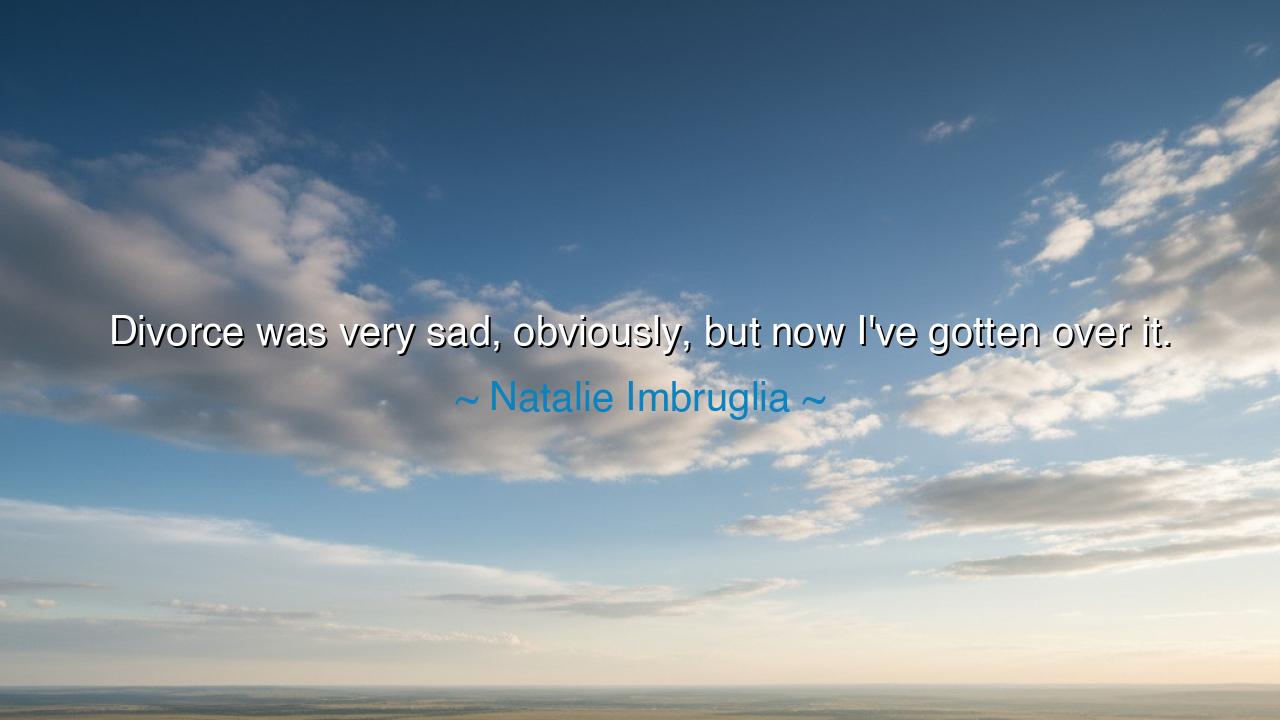
Divorce was very sad, obviously, but now I've gotten over it.






Hear the words of Natalie Imbruglia, uttered with honesty and quiet strength: “Divorce was very sad, obviously, but now I’ve gotten over it.” In this brief saying lies the arc of human sorrow and recovery—the recognition of deep loss, the acceptance of grief, and the emergence into healing. It is a statement not only about the ending of a union, but about the endurance of the soul when faced with life’s inevitable storms.
The meaning of her words is twofold. First, she acknowledges the sadness. There is no denial, no pretense that such an event is easy. Divorce, like death, severs bonds once thought unbreakable, and it carries with it mourning, regret, and disappointment. But second, she declares that she has “gotten over it.” Here we see not indifference, but resilience: the ability to move through pain without being chained forever to it. This is the balance of wisdom—to honor sorrow without being consumed by it.
The ancients, too, knew this truth. The Stoic philosophers taught that all things are impermanent: relationships, wealth, even life itself. To cling too tightly to what must pass is to invite endless grief, but to accept its passing is to discover peace. Epictetus himself counseled that when we lose what we love, we must remember we were always its caretaker, never its owner. Imbruglia’s words echo this ancient wisdom, showing that healing begins when we release what cannot be held.
History offers us examples of this same resilience. Consider Henry VIII and Catherine of Aragon, whose divorce shook nations and changed the course of Europe. For Catherine, the end of her marriage was bitter and public, yet she carried herself with dignity to her final days, declaring loyalty to her faith and to her daughter. Though the sadness was undeniable, she did not let it shatter her spirit. In both her story and Imbruglia’s, we see the same truth: grief is real, but it need not be the final chapter.
Her words also speak to the universal cycle of suffering and renewal. For every soul will encounter loss—whether of love, friendship, or dream. In the moment of pain, it feels endless, yet time and courage bring healing. What once seemed unbearable becomes a memory one can live with, and even draw wisdom from. To say “I’ve gotten over it” is not to dismiss the wound, but to declare victory over despair. It is to say, “I have lived through it, and I am still here.”
The lesson, O seeker, is clear: when sorrow comes, do not flee from it, and do not pretend it does not exist. Name it as sadness, sit with it, honor it. But then, in time, rise and move forward. For life demands not that we be unbroken, but that we continue. The strength of the human spirit is not in never falling, but in rising again with deeper wisdom and compassion.
Practical is this counsel: if you face the grief of divorce or loss, allow yourself to mourn. Speak your sorrow, write it, weep it, let it flow. But also trust that healing will come. Surround yourself with those who lift you, engage in the work of rebuilding, and choose not to let bitterness hold you captive. For one day, like Imbruglia, you too may look back and say, “It was sad, but I have gotten over it.”
Thus, Natalie Imbruglia’s words stand as a quiet anthem of survival: “Divorce was very sad, obviously, but now I’ve gotten over it.” Let them remind us that all endings carry sorrow, yet beyond the sorrow lies renewal. To endure is human; to heal is divine; and to move forward after pain is the greatest triumph of all.






AAdministratorAdministrator
Welcome, honored guests. Please leave a comment, we will respond soon